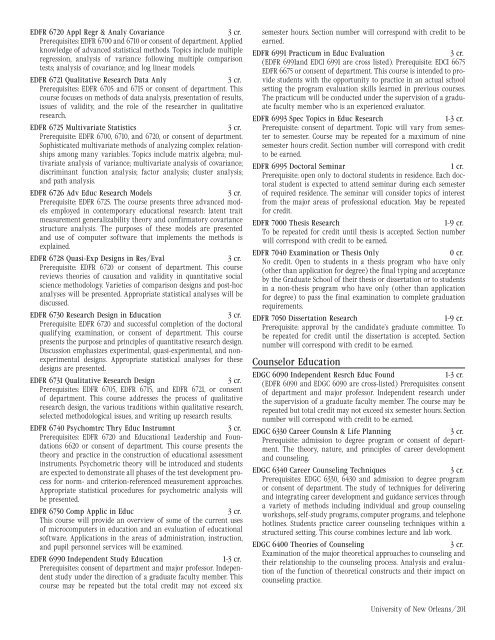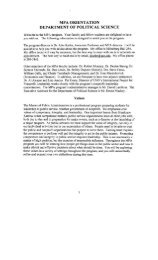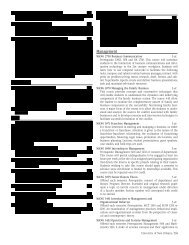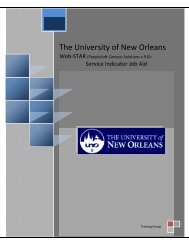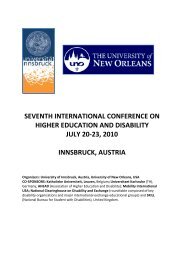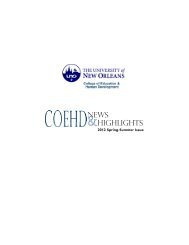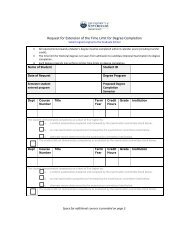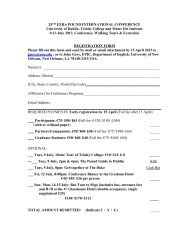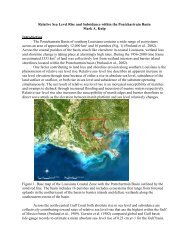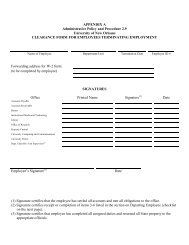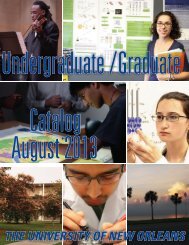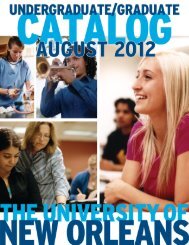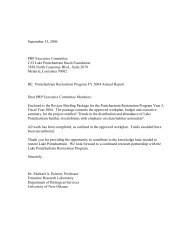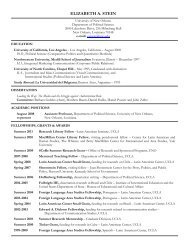Untitled - University of New Orleans
Untitled - University of New Orleans
Untitled - University of New Orleans
You also want an ePaper? Increase the reach of your titles
YUMPU automatically turns print PDFs into web optimized ePapers that Google loves.
EDFR 6720 Appl Regr & Analy Covariance<br />
3 cr.<br />
Prerequisites: EDFR 6700 and 6710 or consent <strong>of</strong> department. Applied<br />
knowledge <strong>of</strong> advanced statistical methods. Topics include multiple<br />
regression, analysis <strong>of</strong> variance following multiple comparison<br />
tests; analysis <strong>of</strong> covariance; and log linear models.<br />
EDFR 6721 Qualitative Research Data Anly<br />
3 cr.<br />
Prerequisites: EDFR 6705 and 6715 or consent <strong>of</strong> department. This<br />
course focuses on methods <strong>of</strong> data analysis, presentation <strong>of</strong> results,<br />
issues <strong>of</strong> validity, and the role <strong>of</strong> the researcher in qualitative<br />
research.<br />
EDFR 6725 Multivariate Statistics<br />
3 cr.<br />
Prerequisite: EDFR 6700, 6710, and 6720, or consent <strong>of</strong> department.<br />
Sophisticated multivariate methods <strong>of</strong> analyzing complex relationships<br />
among many variables. Topics include matrix algebra; multivariate<br />
analysis <strong>of</strong> variance; multivariate analysis <strong>of</strong> covariance;<br />
discriminant function analysis; factor analysis; cluster analysis;<br />
and path analysis.<br />
EDFR 6726 Adv Educ Research Models<br />
3 cr.<br />
Prerequisite: EDFR 6725. The course presents three advanced models<br />
employed in contemporary educational research: latent trait<br />
measurement generalizability theory and confirmatory covariance<br />
structure analysis. The purposes <strong>of</strong> these models are presented<br />
and use <strong>of</strong> computer s<strong>of</strong>tware that implements the methods is<br />
explained.<br />
EDFR 6728 Quasi-Exp Designs in Res/Eval<br />
3 cr.<br />
Prerequisite: EDFR 6720 or consent <strong>of</strong> department. This course<br />
reviews theories <strong>of</strong> causation and validity in quantitative social<br />
science methodology. Varieties <strong>of</strong> comparison designs and post-hoc<br />
analyses will be presented. Appropriate statistical analyses will be<br />
discussed.<br />
EDFR 6730 Research Design in Education<br />
3 cr.<br />
Prerequisite: EDFR 6720 and successful completion <strong>of</strong> the doctoral<br />
qualifying examination, or consent <strong>of</strong> department. This course<br />
presents the purpose and principles <strong>of</strong> quantitative research design.<br />
Discussion emphasizes experimental, quasi-experimental, and nonexperimental<br />
designs. Appropriate statistical analyses for these<br />
designs are presented.<br />
EDFR 6731 Qualitative Research Design<br />
3 cr.<br />
Prerequisites: EDFR 6705, EDFR 6715, and EDFR 6721, or consent<br />
<strong>of</strong> department. This course addresses the process <strong>of</strong> qualitative<br />
research design, the various traditions within qualitative research,<br />
selected methodological issues, and writing up research results.<br />
EDFR 6740 Psychomtrc Thry Educ Instrumnt<br />
3 cr.<br />
Prerequisites: EDFR 6720 and Educational Leadership and Foundations<br />
6620 or consent <strong>of</strong> department. This course presents the<br />
theory and practice in the construction <strong>of</strong> educational assessment<br />
instruments. Psychometric theory will be introduced and students<br />
are expected to demonstrate all phases <strong>of</strong> the test development process<br />
for norm- and criterion-referenced measurement approaches.<br />
Appropriate statistical procedures for psychometric analysis will<br />
be presented.<br />
EDFR 6750 Comp Applic in Educ<br />
3 cr.<br />
This course will provide an overview <strong>of</strong> some <strong>of</strong> the current uses<br />
<strong>of</strong> microcomputers in education and an evaluation <strong>of</strong> educational<br />
s<strong>of</strong>tware. Applications in the areas <strong>of</strong> administration, instruction,<br />
and pupil personnel services will be examined.<br />
EDFR 6990 Independent Study Education<br />
1-3 cr.<br />
Prerequisites: consent <strong>of</strong> department and major pr<strong>of</strong>essor. Independent<br />
study under the direction <strong>of</strong> a graduate faculty member. This<br />
course may be repeated but the total credit may not exceed six<br />
semester hours. Section number will correspond with credit to be<br />
earned.<br />
EDFR 6991 Practicum in Educ Evaluation<br />
3 cr.<br />
(EDFR 6991and EDCI 6991 are cross listed). Prerequisite: EDCI 6675<br />
EDFR 6675 or consent <strong>of</strong> department. This course is intended to provide<br />
students with the opportunity to practice in an actual school<br />
setting the program evaluation skills learned in previous courses.<br />
The practicum will be conducted under the supervision <strong>of</strong> a graduate<br />
faculty member who is an experienced evaluator.<br />
EDFR 6993 Spec Topics in Educ Research<br />
1-3 cr.<br />
Prerequisite: consent <strong>of</strong> department. Topic will vary from semester<br />
to semester. Course may be repeated for a maximum <strong>of</strong> nine<br />
semester hours credit. Section number will correspond with credit<br />
to be earned.<br />
EDFR 6995 Doctoral Seminar<br />
1 cr.<br />
Prerequisite: open only to doctoral students in residence. Each doctoral<br />
student is expected to attend seminar during each semester<br />
<strong>of</strong> required residence. The seminar will consider topics <strong>of</strong> interest<br />
from the major areas <strong>of</strong> pr<strong>of</strong>essional education. May be repeated<br />
for credit.<br />
EDFR 7000 Thesis Research<br />
1-9 cr.<br />
To be repeated for credit until thesis is accepted. Section number<br />
will correspond with credit to be earned.<br />
EDFR 7040 Examination or Thesis Only<br />
0 cr.<br />
No credit. Open to students in a thesis program who have only<br />
(other than application for degree) the final typing and acceptance<br />
by the Graduate School <strong>of</strong> their thesis or dissertation or to students<br />
in a non-thesis program who have only (other than application<br />
for degree) to pass the final examination to complete graduation<br />
requirements.<br />
EDFR 7050 Dissertation Research<br />
1-9 cr.<br />
Prerequisite: approval by the candidate’s graduate committee. To<br />
be repeated for credit until the dissertation is accepted. Section<br />
number will correspond with credit to be earned.<br />
Counselor Education<br />
EDGC 6090 Independent Resrch Educ Found<br />
1-3 cr.<br />
(EDFR 6090 and EDGC 6090 are cross-listed) Prerequisites: consent<br />
<strong>of</strong> department and major pr<strong>of</strong>essor. Independent research under<br />
the supervision <strong>of</strong> a graduate faculty member. The course may be<br />
repeated but total credit may not exceed six semester hours. Section<br />
number will correspond with credit to be earned.<br />
EDGC 6330 Career Counsln & Life Planning<br />
3 cr.<br />
Prerequisite: admission to degree program or consent <strong>of</strong> department.<br />
The theory, nature, and principles <strong>of</strong> career development<br />
and counseling.<br />
EDGC 6340 Career Counseling Techniques<br />
3 cr.<br />
Prerequisites: EDGC 6330, 6430 and admission to degree program<br />
or consent <strong>of</strong> department. The study <strong>of</strong> techniques for delivering<br />
and integrating career development and guidance services through<br />
a variety <strong>of</strong> methods including individual and group counseling<br />
workshops, self-study programs, computer programs, and telephone<br />
hotlines. Students practice career counseling techniques within a<br />
structured setting. This course combines lecture and lab work.<br />
EDGC 6400 Theories <strong>of</strong> Counseling<br />
3 cr.<br />
Examination <strong>of</strong> the major theoretical approaches to counseling and<br />
their relationship to the counseling process. Analysis and evaluation<br />
<strong>of</strong> the function <strong>of</strong> theoretical constructs and their impact on<br />
counseling practice.<br />
<strong>University</strong> <strong>of</strong> <strong>New</strong> <strong>Orleans</strong>/201


